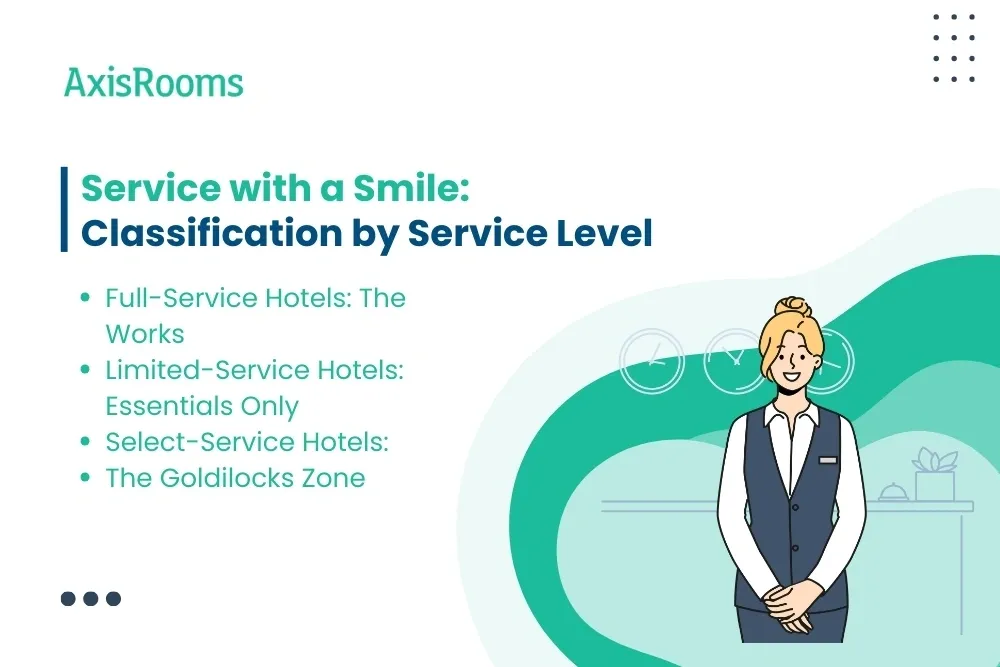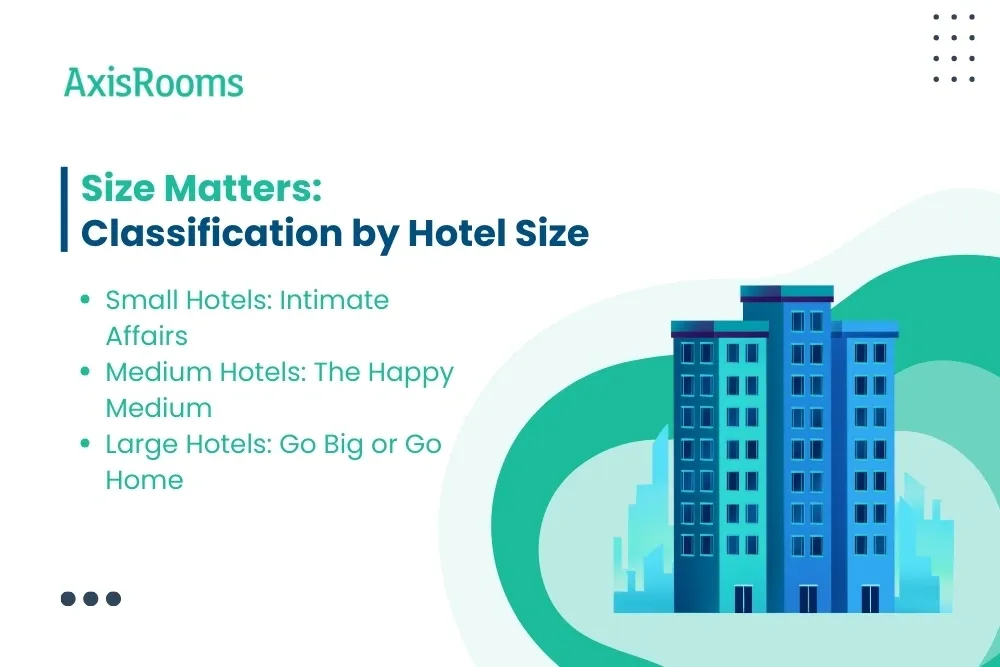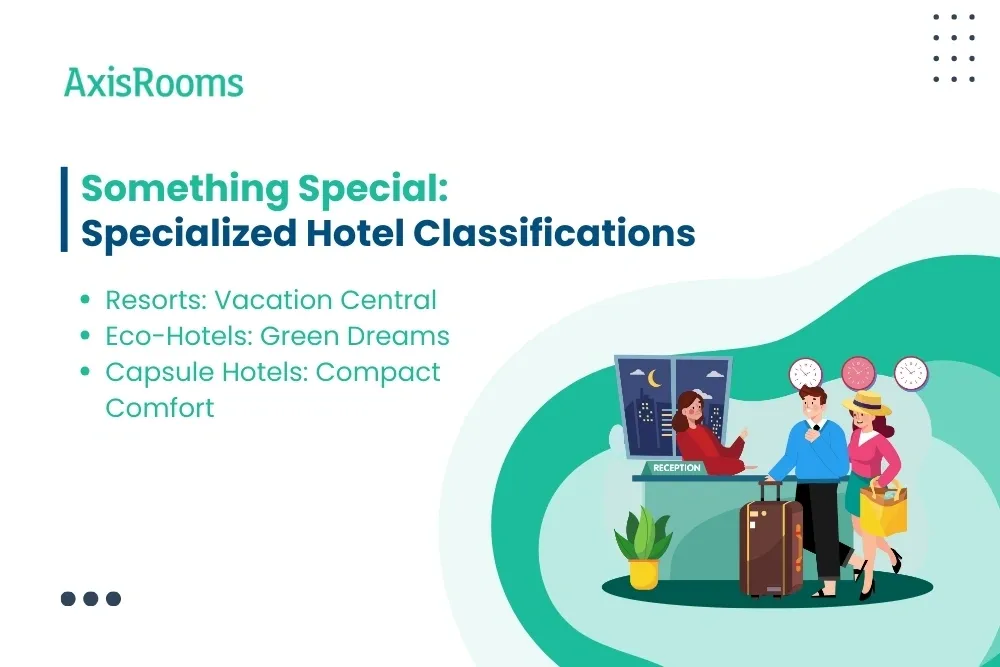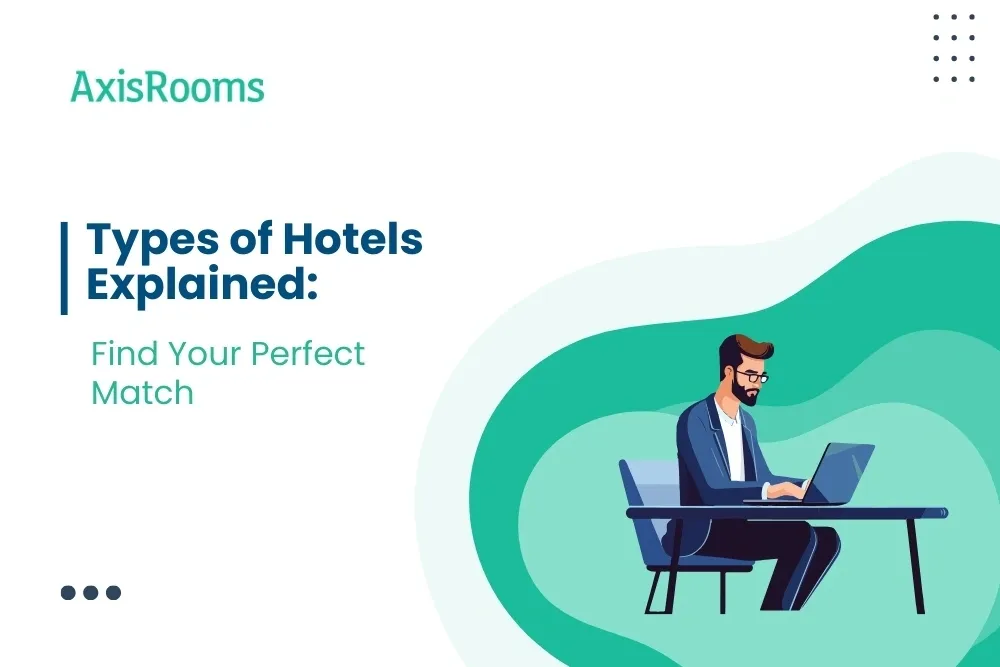For any traveler or hospitality professional, there's that moment of decision: choosing the right hotel. But with the vast array of options out there, how do you navigate the sea of choices? Let's break down the world of hotel classifications and discover how they can help you find your perfect stay.
The Power of Classification
Before we dive into the nitty-gritty, let's talk about why these classifications matter. They're not just arbitrary labels; they're your roadmap to setting expectations and understanding what each property offers. Whether you're a budget-conscious backpacker or a luxury-seeking jet-setter, knowing these classifications is your first step to travel success.
Stars in Their Eyes: The Classic Rating System
We've all heard of five-star hotels, but what does that really mean? Let's demystify the star rating system:
One-Star Hotels: The Basics
One-star hotels are no-frills, budget-friendly options perfect for travelers who just need a place to crash. These properties offer clean sheets, a roof over your head, and not much else, making them ideal for adventurous backpackers or budget-conscious road-trippers.
Two-Star Hotels: A Step Up
Two-star hotels offer a bit more comfort without breaking the bank. You'll find added amenities like a simple breakfast service, private bathrooms, and maybe even a TV in your room. These properties are suitable for budget-minded families or solo travelers wanting more privacy.
Three-Star Hotels: The Middle Ground
Three-star hotels are where things start to get interesting. Expect more spacious rooms, better amenities, and often an on-site restaurant. These properties are the sweet spot for many travelers, offering a balance of comfort and value.
Four-Star Hotels: Luxury Lite
Four-star hotels are upscale properties offering superior quality, multiple dining options, and additional facilities like fitness centers or spas. Service is a priority here, with staff going the extra mile to ensure a memorable stay.
Five-Star Hotels: The Crème de la Crème
Five-star hotels represent the pinnacle of luxury. These properties offer exceptional service, top-tier amenities, and unique experiences that go beyond just a place to sleep. From personal butlers to Michelin-starred restaurants, five-star hotels pull out all the stops.
Service with a Smile: Classification by Service Level
But stars aren't everything. Let's look at how hotels are grouped based on the services they offer:

Full-Service Hotels: The Works
Full-service hotels offer everything from multiple restaurants to concierge services. These properties cater to guests who want comprehensive amenities without leaving the hotel.
Limited-Service Hotels: Essentials Only
Limited-service hotels provide clean rooms and basic amenities at wallet-friendly prices. They're ideal for no-nonsense travelers focused on exploring the destination.
Select-Service Hotels: The Goldilocks Zone
Select-service hotels balance luxury and practicality. They offer a curated selection of amenities, catering to specific traveler needs without the full range of services found in luxury hotels.
Who's Running the Show? Classification by Ownership and Management
The way a hotel is owned and managed can significantly impact your stay. Let's explore:
Independent Hotels: One of a Kind
Independent hotels are privately owned properties that often offer unique, personalized experiences. These gems are great for travelers looking for something off the beaten path, providing a taste of local culture and individuality that chain hotels can't match.
Chain Hotels: Consistency is Key
Chain hotels are part of larger brands, offering standardized experiences across locations. They're perfect if you know what you like and want it everywhere you go, providing a reliable and familiar experience whether you're in New York or New Delhi.
Franchise Hotels: The Best of Both Worlds
Franchise hotels are independently owned but operate under a brand's guidelines. You get the consistency of a chain with a touch of local flavor, offering a balanced experience that combines brand standards with individual touches.
Know Your Audience: Classification by Target Market
Different strokes for different folks – hotels know this well:
Business Hotels: Work Hard, Sleep Well
Business hotels cater to corporate travelers with amenities like conference rooms, business centers, and a formal atmosphere. They prioritize efficiency with fast Wi-Fi and ergonomic workspaces.
Family Hotels: Fun for All Ages
Family hotels offer kid-friendly features, activities, and larger rooms or suites. They ensure entertainment for all family members with amenities like kids' clubs and family pools.
Boutique Hotels: Small but Mighty
Boutique hotels provide intimate settings with unique themes and personalized touches. They offer curated, Instagram-worthy experiences with individually designed rooms and strong local connections.
Airport Hotels: Convenience is King
Airport hotels prioritize convenience with easy airport access. They cater to travelers with early flights or long layovers, offering amenities like 24/7 dining and airport shuttles.
Size Matters: Classification by Hotel Size
From cozy inns to sprawling resorts, size can define your experience:

Small Hotels: Intimate Affairs
Small hotels have up to 25 rooms, offering personalized attention. They create a home-away-from-home feel, ideal for travelers seeking an intimate atmosphere with tailored services.
Medium Hotels: The Happy Medium
Medium hotels (26 to 300 rooms) balance personalized service with varied amenities. They hit the sweet spot for many travelers, offering comfort without overwhelming size.
Large Hotels: Go Big or Go Home
Large hotels (over 300 rooms) are often destinations themselves. They provide extensive facilities and services, catering to guests who enjoy variety and grandeur.
How Long Are You Staying? Classification by Length of Stay
Your travel duration can dictate your ideal hotel type:
Transient Hotels: Short and Sweet
Transient hotels are designed for short stays, often with streamlined services. These properties cater to travelers on the move, offering efficient check-in processes and essential amenities. Transient hotels are perfect for business trips, weekend getaways, or quick stopovers.
Extended Stay Hotels: Home Away from Home
Extended stay hotels are equipped for longer stays with kitchen facilities and home-like amenities. These properties offer spacious accommodations, often including separate living areas and full-sized appliances. Extended stay hotels are ideal for relocations, long-term projects, or travelers who prefer more space and the comforts of home.
Something Special: Specialized Hotel Classifications
For those seeking unique experiences, these specialized classifications might be just the ticket:

Resorts: Vacation Central
Resorts are all-in-one destinations offering various activities and entertainment. They provide multiple dining options, spa facilities, and recreational activities. Resorts cater to guests who want to relax and play without leaving the property.
Eco-Hotels: Green Dreams
Eco-hotels focus on sustainability and environmental consciousness. They incorporate green technologies, sustainable building materials, and eco-friendly practices. These hotels offer organic linens, locally-sourced food options, and energy-efficient systems to minimize carbon footprint.
Capsule Hotels: Compact Comfort
Capsule hotels offer minimalist accommodations in small, efficient spaces. They provide basic necessities in a compact area, often stacked in rows or columns. These hotels cater to budget-conscious travelers or those seeking a unique, space-efficient experience.
Remember, for any hotelier, there's that sinking feeling: empty rooms at the end of the day. That's why understanding these classifications isn't just for travelers - it's crucial for those in the industry to position their properties correctly and meet ( or exceed ) guest expectations.
Technology in Hotel Management
- Centralized inventory management across all online platforms.
- Dynamic pricing capabilities to maximize revenue.
- Increased online visibility, especially beneficial for independent hotels.
- Time-saving automation, allowing staff to focus on guest experiences.
- Data-driven insights for informed decision-making.
By leveraging such tools, hotels can streamline operations and boost their online presence, ultimately providing better service to their guests. In the competitive world of hospitality, embracing technology can be the key to standing out, regardless of your hotel's classification.
The Bottom Line: Your Perfect Stay Awaits
In the ever-evolving world of hospitality, understanding these classifications is your key to unlocking the perfect stay. Whether you're after luxury, convenience, or something entirely unique, there's a hotel classification out there that fits the bill.
Remember, the best hotel for you is the one that meets your specific needs and preferences. So, armed with this knowledge, go forth and book your next adventure with confidence. Happy travels!


